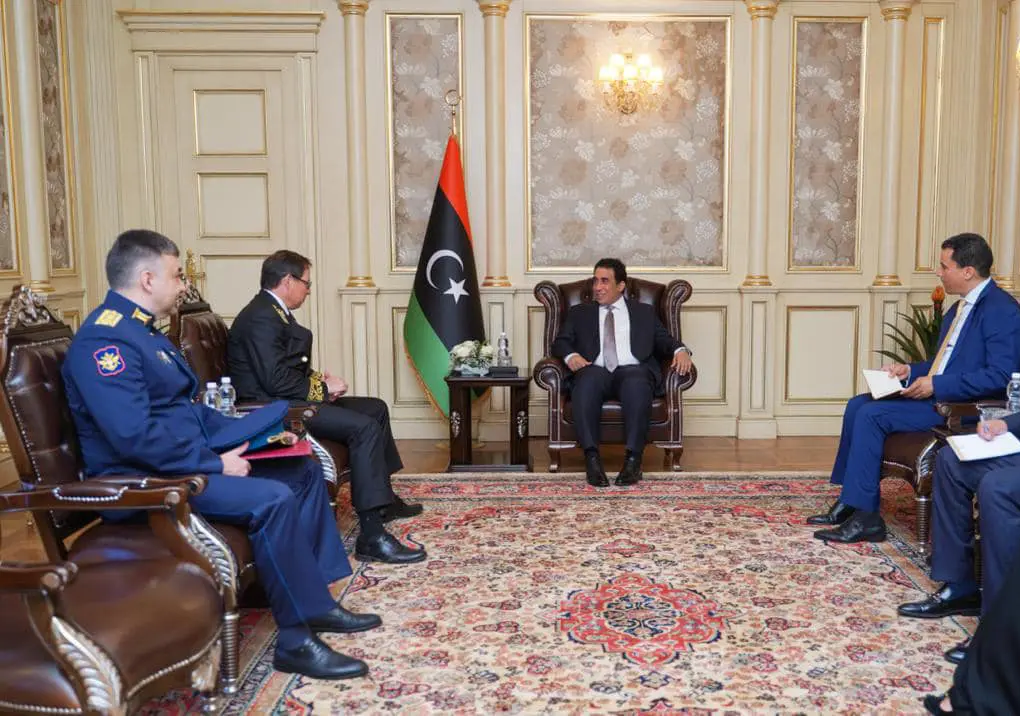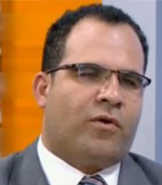The recent active engagements conducted by Aidar Aganin, the newly appointed Russian ambassador to Libya, signify a transformative depiction of Russia’s role in the region. Following the reopening of the Russian embassy in Tripoli, Ambassador Aganin commenced his duties on June 26th. Notably, on July 12th, he conducted a series of meetings with Mohammed Al-Menfi, the President of the Presidential Council, along with various ministers of the unity government. These meetings encompassed diverse topics concerning the future of the Libyan political process and fostered discussions on economic relations, with a particular focus on the oil sector as a significant area of mutual interest between the two nations.
The previous perception of Russia’s role in Libya predominantly revolved around its ties with eastern Libya and the activities of the “Wagner” group in that region. This portrayal was potentially accentuated by the Western political stance, which further solidified after the outbreak of the Russo-Ukrainian war on February 24, 2022. Consequently, the active political involvement of Russia in the Libyan issue, particularly its diplomatic efforts within the Security Council, became overshadowed. Yet, it is important to acknowledge that Russia’s role holds significant influence in shaping international decisions pertaining to the Libyan crisis. Frequently, the Russian position diverges from that of Western powers, resulting in infrequent agreements between them. Moreover, Russia has emerged as a destination for Libyan politicians from various political orientations, irrespective of their affiliations.
A Significant Leap
Despite Russia’s significant involvement in the Libyan crisis, the official channels of Libyan-Russian diplomatic relations have not been fully reactivated as they were prior to the outbreak of the conflict. Since the tumultuous period following the overthrow of Colonel Muammar Gaddafi’s regime in 2011, during which Russia’s ambassador Vladimir Chamonov was withdrawn, Russia has not appointed a new ambassador to Libya. Colonel Gaddafi’s regime was regarded as a strong ally by Russia, making the chaos that engulfed the country a crucial factor in this decision. In contrast, most Western powers maintained diplomatic representatives, such as ambassadors or chargés d’affaires, in Tripoli or operated their diplomatic duties from Tunisia. While Western powers actively engaged in diplomatic efforts, Russia’s involvement was mainly limited to occasional visits by Russian diplomats to Tripoli, notably Deputy Foreign Minister Mikhail Bogdanov, and participation in international events concerning Libya.
This perspective shaped the perceptions of both parties regarding their shared relations and interests. From Russia’s standpoint, it witnessed the advancement of relations between the Tripoli government, the United States, and other Western factions at its own expense. Western powers, including armed factions in Libya, viewed Russia, particularly through the presence of the “Wagner” group, as a threat to their interests. Moreover, the historical cooperation between Russia and the previous regime played a significant role in shaping these relations. Moscow has consistently advocated for the inclusion of factions affiliated with the former regime in the political process since the onset of the crisis. This stance further contributed to the perspective held by Western powers in Libya, who perceive Russia as aiming to reinstate the previous regime once again.
The resumption of diplomatic relations marks a significant shift in perspective for both parties involved. Following the appointment of the new Russian ambassador on December 29th, there is a recognition that the security situation in Libya has improved compared to the past. However, various local assessments in Libya suggest that other factors are at play. One of these factors is Moscow’s ongoing process of reshaping its role in Libya, which is evident in its newfound openness to engaging with all parties. The emergence of the Russian Wagner Group rebellion further solidifies this evolving image. As a result, Moscow now recognizes the need for a diplomatic channel to effectively manage official relations with the Libyan government in Tripoli. Western assessments indicate that Moscow is likely to restructure the leadership of the Wagner Group and potentially redefine its role to primarily focus on safeguarding Russian interests in Libya.
The perception on the Libyan side has shifted regarding the Wagner presence, as it is no longer seen as an existential threat to the western regions of Libya or to the armed factions. The likelihood of returning to the East-West polarization experienced in 2019 is also considered unlikely. The Presidential Council has taken on the task of national reconciliation, viewing the integration of the previous regime into the political process as more of a national choice rather than an external demand. Although the integration process is acknowledged to face challenges and resistance from armed factions in western Libya, the extent of the former regime’s involvement in the transitional authority has changed. The upcoming elections will serve as the primary measure of progress once this milestone is achieved.
Key Variables
As mentioned earlier, it is anticipated that the Russian diplomatic role will provide added value to Russia’s position in the Libyan landscape, which will depend on the following variables:
- Expanding the Russian presence in Libya: Russia’s strategic shift towards Tripoli, the capital of Libya, signifies a significant expansion of its operations across the country, unlike before. This positioning allows Moscow to have a wider reach for its foreign policy objectives in Libya and enables more active engagement with the Libyan landscape. It brings Russia in closer proximity to all key political stakeholders, encompassing international rivals as well as local Libyan factions.
- Heightened Russian engagement in the political arena: During Ambassador Aganin’s meeting with President of the Presidential Council, Mohammed Al-Menfi, the ambassador expressed Russia’s backing for the newly established High Financial Supervisory Mechanism. This mechanism aims to prevent the exacerbation of the crisis between eastern and western Libya, addressing concerns of potential mismanagement of public funds by the Unity Government. Moreover, the Russian ambassador emphasized his country’s support for the High National Elections Commission in facilitating the electoral process. This emphasis underscores Russia’s commitment to ensuring the participation of all political factions in the electoral proceedings. Thus, Russia places a strong emphasis on prioritizing the political process and upholding the principle of inclusive representation.
- Developing partnerships in the oil sector is a priority following a meeting between Aganin and Mohamed Aoun, the Minister of Oil and Gas in the Unity Government. They have mutually agreed on the necessity of activating the joint committee and conducting meetings, visits, conferences, seminars, and workshops to introduce Russian technology in the oil industry.
In 2017, a general agreement was signed with the previous Government of National Accord. However, this agreement was not implemented, and Russian companies faced stiff competition from Western counterparts, limiting their expansion. Nonetheless, Tatneft, a Russian company, recently announced significant oil discoveries in the Ghadames Basin.
Considering Libya’s imperative to enhance production and develop infrastructure through foreign investments, as highlighted by Mustafa Sanalla, the Chairman of the National Oil Corporation, it is anticipated that Russia will emerge as a formidable competitor in the sector.
A New Role
In conclusion, the Russian diplomatic presence in Tripoli is anticipated to bring about a restructuring of Russia’s role in Libya. Diplomatic mechanisms will take precedence over previous reliance on individuals such as researchers Maxim Shugaley and Samer Suwaidan, as well as the involvement of the Wagner Group in the eastern and southern regions of the country.
The shift from unconventional tools to natural tools in foreign policy is evident, but the nature and magnitude of challenges that Russia faces on the Libyan stage may vary. While Russia’s diplomatic approach in Libya does not diminish the substantial challenges it confronts, it is worth noting that Libya remains a highly contested arena between Russia and the West. Nonetheless, on a domestic level, Russia stands to gain by closely managing its policies, prioritizing the cultivation of local allies, advancing its interests, and addressing the situation surrounding the Wagner Group.


